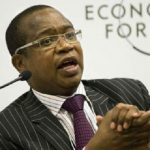 The United States which imposed sanctions on Zimbabwe 15 years ago might want to see Harare deal decisively with four key issues: corruption, women participation, youths and re-engagement, A United States based Zimbabwean Pearl Matibe told the Voice of America.
The United States which imposed sanctions on Zimbabwe 15 years ago might want to see Harare deal decisively with four key issues: corruption, women participation, youths and re-engagement, A United States based Zimbabwean Pearl Matibe told the Voice of America.
Matibe who is helping about 20 Democratic candidates in the mid-term elections taking place in the United States said that United States policy on Africa was changing.
She said relations between the United States and China and those between China and Africa might have a big role to play as the United States does not want to be left out.
United States President Donald Trump, however, seems to be paying more attention to domestic rather than foreign policy and has declared himself a nationalist.
Asked by Fix News what nationalism meant to him, Trump responded: “I don’t have to clarify. It means I love the country, it means I’m fighting for the country. I look at two things, globalists and nationalists. I’m somebody that wants to take care of our country, because for many, many years, you know this better than anybody — our leaders have been more worried about the world than they have about the United States and they leave us in a mess — whether it’s the wars, whether it’s the economy, whether it’s debt, whether it’s all of the things that they’ve done, including putting in the wrong Supreme Court Justices and we’re — we’ve really put two great ones in — no, I’m proud of this country and I call that ‘nationalism’; I call it being a nationalist and I don’t see any other connotation than that.
“Now, as soon as you make any statement nowadays with the political correctness world, they make a big deal. I’m not a globalist, but I want to take care of the globe, but first I have to take care of our country. I want to help people around the world, but we have to take care of our country, or we won’t have a country, including — we have to take care of our country at the border.”
Matibe said people were likely to see four key issues in the new US policy towards Africa, and Zimbabwe, in particularly.
The first was that Washington would want to see Zimbabwe taking a hold and dealing with corruption and clearing out systematic corruption. That is going to be key in that policy.
The second thing was the participation of women. The United States would like to see a lot of inclusivity not just in positions of women but in the discussions and decision making and the deliberative debates that women are included at the table as debates are happening.
The third thing was the focus on youth. “They do see that youths are the future. They have a very different view to our current ruling party. They do seem to focus on the fact that the future will be decided and is now for the youth and that the older people should now leave it to the younger people”.
The fourth was that they would like to see a recommitment to reengagement that is sincere and transparent with respect for human rights.
The United States sanctions on Zimbabwe are under the Zimbabwe Democracy and Economic Recovery Act which was brought into effect ibn 2003 but has been amended to allow Zimbabwe to reform before they are lifted.
Zimbabwe’s richest man, Strive Masiyiwa has argued that the sanctions are no longer justified.
“If Zimbabwe had been a person who committed a crime, for which they went to prison, would you not say 20 years is enough?” he asked.
“Zimbabwe has served its prison time. It’s time for the country to be given a chance to get back on its feet,” he said.
(392 VIEWS)


